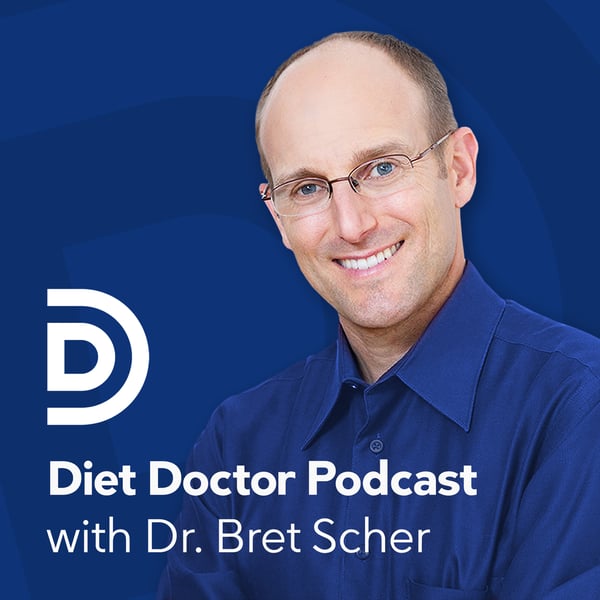#100 - Bipolar disorder and keto diets
Diet Doctor Podcast
dietdoctorpodcast
4.8 • 711 Ratings
🗓️ 28 June 2022
⏱️ 89 minutes
🧾️ Download transcript
Summary
Transcript
Click on a timestamp to play from that location
| 0:00.0 | Welcome back to the Diet Doctor podcast. I'm your host, Dr. Brett Schur. Today we're going to have |
| 0:07.2 | a focused episode on bipolar disorder and the role of a ketogenic diet in the therapy of bipolar disorder. |
| 0:14.3 | And we're going to hear from three individuals. First is Matt Bazuki, who has an incredible |
| 0:18.7 | personal story of his journey through bipolar disorder |
| 0:21.9 | and how lifestyle treatment, including a ketogenic diet, really helped him come out of it and |
| 0:26.2 | back to a normal lifestyle, as he calls it. |
| 0:28.3 | We're also going to hear from Dr. Ian Campbell, who himself has a history of bipolar disorder |
| 0:32.6 | and now has transitioned as a PhD doing research on a ketogenic diet and bipolar disorder. |
| 0:39.0 | And then finally, we'll hear from Dr. Chris Palmer, who's been on the Diet Doctor podcast before, |
| 0:43.5 | to get his perspective on how a ketogenic diet and lifestyle therapy in general fits into bipolar treatment. |
| 0:50.3 | Now, bipolar disorder is a very common disease. |
| 0:53.6 | And first, what is it? |
| 0:54.6 | Well, it's classically been called manic depressive disorder, and there are a couple |
| 1:00.0 | types, but bipolar one means you have some mania and some severe depression. |
| 1:05.0 | You cycle through both. |
| 1:06.7 | Bipolar two is more of the depression part of it, but they're certainly related in terms of the cycling of mood disorders. |
| 1:15.9 | And it can be a debilitating condition. |
| 1:18.3 | And as you'll hear from Matt Bazuki, he was homeless and could not lead a normal life and was debilitated because of this disorder. |
| 1:27.3 | But it's very common |
| 1:28.3 | occurring in 2.8% of all adults and 5% of adults in the age of 18 to 29. And that's usually |
| 1:35.5 | the age range where it manifests and where it's first seen. And treatment consists of a slew |
| 1:42.5 | of medications with a slew of side effects, but these medications |
... |
Please login to see the full transcript.
Disclaimer: The podcast and artwork embedded on this page are from dietdoctorpodcast, and are the property of its owner and not affiliated with or endorsed by Tapesearch.
Generated transcripts are the property of dietdoctorpodcast and are distributed freely under the Fair Use doctrine. Transcripts generated by Tapesearch are not guaranteed to be accurate.
Copyright © Tapesearch 2025.

